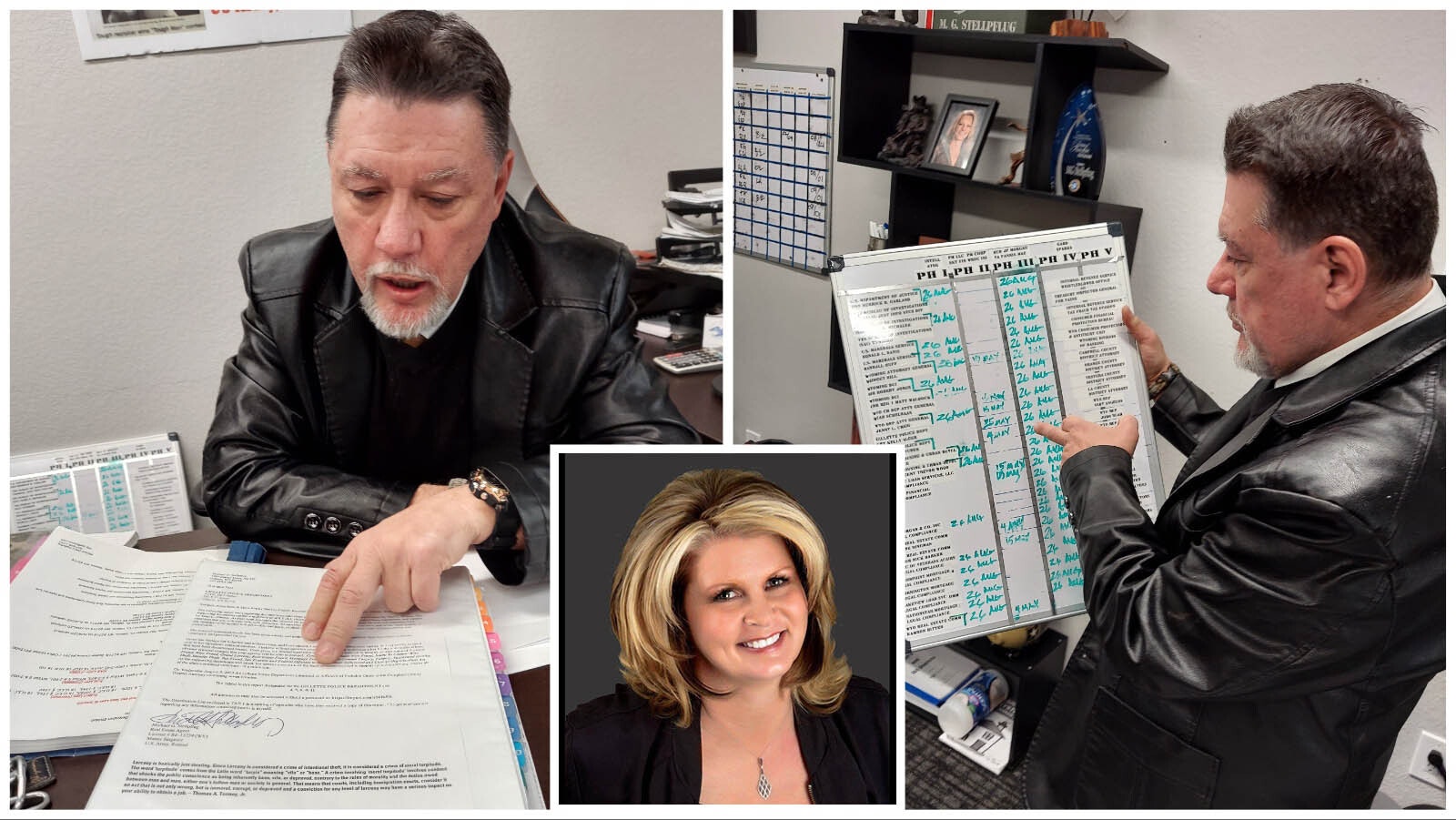After the attorney defending a Gillette, Wyoming, woman accused of a real-estate scam asked a phone company to hand over nearly two years’ worth of her alleged victim’s personal phone records, the attorney got some or all of the records he requested.
The prosecutor’s not happy about it.
Neither is the man whose phone records have reportedly been handed over to the attorney of a woman he’s accusing of a felony.
It’s an unusual request, and while the defense attorney’s subpoena has infuriated prosecutors and the alleged crime victim, it doesn’t necessarily mean the attorney broke the rules, an experienced criminal defender told Cowboy State Daily.
Within 15 Days
Sheridan-based defense attorney Ryan Healy sent a notice to TracFone Wireless Inc. on July 23, commanding the phone company to send to his office all of Michael "MG" Stellpflug’s phone records for nearly the past two years, including call data and text contents.
Stellpflug had turned in fellow Gillette real estate agent Tami Hinson to law enforcement last year on claims that she forged the signatures of other real estate agents to win more commission for herself.
When Campbell County Attorney Nathan Henkes filed a motion to quash, or stop, the subpoena eight days later, Healy already had some or all of Stellpflug’s phone records in his possession, according to court testimony in a hearing last week.
“I didn’t file a response to the motion to quash because I had the records,” Healy told Campbell County District Court Judge Michael McGrady in a Sept. 5 hearing in Hinson’s criminal case.
Healy said he’s happy to give the records to the judge, and he’s already sent the records to the prosecutor’s office.
Henkes derided the whole act as wrongful, saying Healy’s subpoena request for nearly two years of the alleged victim’s phone data with essentially no content constraints was overbroad, and that Healy violated the state’s subpoena procedures by asking TracFone to send them to his office.
“None of that evidence should ever have been turned over, should not have been sought, and should not have been sought the way it was,” said Henkes. “It was unlawfully obtained, and it should not be subsequently used in a criminal proceeding.”
Henkes said he’ll file a motion to keep those records out of Hinson’s trial evidence pool.
He also hinted at further consequences.
“Frankly, your honor — and this is probably going to be up to the individual whose phone records are there — but I think it’s probably something that is going to need to be addressed with the bar counsel,” said Henkes. “If someone’s personal information was unlawfully obtained through the court process, through compulsion, I don’t think someone should be rewarded for that type of behavior.”
McGrady encouraged Henkes to work on his evidence-suppression motion first to get his thinking down in writing.
Henkes did not respond to a request for additional comment.
Healy declined to comment, citing his client's pending case.
TracFone didn’t respond to an email from Cowboy State Daily, and Wyoming State Bar President James Whiting did not respond by publication time to a voicemail request for comment.
But You’ve Got Them
Healy countered Henkes, saying he let the prosecutor’s office know he had the phone records and mailed Henkes a copy of them Aug. 28.
“It doesn’t matter where I got these documents. I could have picked them up in a dumpster,” said Healy. “That doesn’t mean they’re inadmissible (for trial).”
In Wyoming, courts generally only allow trial evidence that will speak in some way to the crimes charged. Healy’s comment indicated that it’s the nature of the evidence, not the way he got it, that will dictate whether it’s allowed at trial.
“Is there a question about illegally obtaining them? I don’t think that applies in this circumstance,” said Healy. “I don’t think that applies to a defendant.”
And The Rules Are …
Ryan Semerad, owner of Casper-based law firm Fuller and Semerad, said Henkes’ frustration doesn’t necessarily prove Healy broke the rules, though he added that he doesn’t know personally which steps Healy took in getting the case victim’s phone records.
Defenders can subpoena documents in criminal cases. They have to fill out a written notice to the court, plus they have to send notice to the prosecutor immediately. If the judge requires defenders in his court to file a written motion requesting the subpoena, then the defender will have to do that as well, said Semerad.
It is standard practice for the subpoenaed person, such as a phone company, to send the requested documents to the defender’s office instead of the court, unless the court has established a rule to the contrary, he added.
“It’s possible Ryan (Healy) complied with all the rules, and TracFone does have to give him all these things,” said Semerad. “It’s also possible (he) skipped one of the steps.”
The court file shows that Healy filed the written notice the same day as the subpoena. It is unclear whether he notified Henkes the day he sent the subpoena, but that notice may not always be filed in the court record, Semerad said.
As for the prosecutor’s claim that Healy broke the rules, Semerad disagreed. He pointed to the same rule of criminal procedure that Henkes cited. That rule says a judge “may” quash oppressive subpoenas and “may” demand to see the records before others do. It doesn’t say the judge must enforce those practices.
But There’s The Quash
But either way, Semerad said, Healy likely can’t use those phone records as trial evidence, because Judge Michael McGrady issued an order to stop the subpoena several days after the records made it to Healy’s office.
Though the judge’s order came days after Healy got the phone records, it still works retroactively, said Semerad.
“You didn’t commit some huge violation by getting them, because you did everything the right way, supposedly,” he said. “(But) when that subpoena has been invalidated, you can’t use those documents at trial.”
Going Forward
Going forward, Healy can apply for an interlocutory, or mid-case, appeal, asking the Wyoming Supreme Court to reverse McGrady’s order quashing the subpoena.
But for some reason, not many Wyoming attorneys are energetic about appealing during criminal cases, Semerad added.
Lastly, Semerad sought to remind everyone that when they use a third-party entity like a phone or social media company to send and receive texts, the entity gains custody of their texts and may be required to hand them over to courts or lawyers.
“You may not like it, and everybody hates the third-party doctrine,” he said. “When it’s text messages, emails — all of that stuff: if it’s housed on a third-party server (I can) subpoena the third-party server.”
Semerad acknowledged that the doctrine sounds shocking.
But in the case of Healy’s subpoena, he said, it pales compared to the levels and quantities of information that law enforcement and prosecutors receive via warrants and subpoenas.
“This is so common, when the defense does something like go get material, and the prosecutor wants to, like shred their shirt over it,” said Semerad. “It’s like, really? They do the same stuff, with more power.”
The Man With The Phone
As for Stellpflug, he was furious after last week’s hearing, telling Cowboy State Daily in a text message that he believes the local court system is “broken,” that Healy acted wrongfully and that McGrady has “amnesia” to that.
“I have no expectations of actual justice at this point,” wrote Stellpflug.
Clair McFarland can be reached at clair@cowboystatedaily.com.





